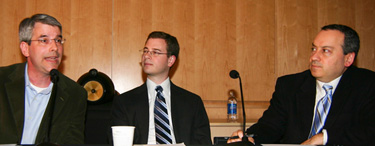| Civic Media and the Law |
|||
|
Thursday, November 4, 2010 We convene an engaging group of law scholars to help outline the legal challenges ahead, suggest policies that might help to protect citizens, and describe what steps every civic media practitioner should take to protect themselves and their users. David Ardia is director of the Citizen Media Law Project which provides legal resources for those involved in online journalism and citizen media. Daniel Schuman is the policy counsel at the Sunlight Foundation. Moderator: Micah Sifry is a co-founder and editor of the Personal Democracy Forum. Co-sponsor: The Center for Future Civic Media An audio recording of Civic Media and the Law is available. Podcast Video of Civic Media and the Law is available.
Summary [This is an edited summary, not a verbatim transcript.] By M. Flourish Klink What happens when ordinary citizens commit acts of journalism, and how does the law protect and circumscribe these acts?
Micah Sifry began by asking the audience, "How many of you are participating in creating or publishing your own media?" Nearly everyone was, identifying themselves as bloggers, journalists, photographers, podcasters, course content creators, sharers of field notes. Then Sifry invited David Ardia to give a short overview of the major features of the law that pertain to people publishing online. There is one instance where Congress did a good job with technology and media, according to Ardia: Section 230 of the Communications Decency Act, which permitted websites to edit user comments to eliminate vulgarity.
Prior to the Internet, publishers of books, magazines and newspapers were liable for the content of their publications, but distributors (for instance, newsstands) were not. Section 230 of the new act essentially lumped webmasters in with distributors, even if they moderated certain comments. Thus, if someone publishes a libelous comment in your weblog, you are not liable - even if you do moderate the comments to some extent. This provision remained in force even after Reno vs. ACLU, which struck down the rest of the Communications Decency Act. Of course, this provision doesn't protect webmasters against copyright claims, which are covered under the Digital Millennium Copyright Act and are a more complex topic. Essentially, however, this provision represents a conscious decision on the part of Congress to separate the online world from the offline world, allowing emerging forms of digital expression some freedom to develop. Next, Sifry asked Daniel Schuman to summarize some of the problems and opportunities confronting those who want to use public documents that are supposed to be open to citizens. Schuman said the Obama administration’s’ Open Government Directive was “an effort to make more public information available online." This directive required, for instance, that many documents be made public on the website data.gov. But the Public Online Information Act of 2010, introduced during Obama’s first term, has not been voted on. It would have required different branches of government to agree on standards, such as shared file formats, in order to make their information more useful and accessible. The proposed Act would also give individuals the right to sue the government if information intended by law to be publicly available was not accessible online. Unfortunately the Public Online Information Act will have to be re-introduced in the new Congress.
There remain many significant roadblocks that impede the public’s access to government information, according to Schuman. For example, "let's say you're interested in congressional ethics information. How do you get it? You go to Washington DC, request a certain subset of 19 documents, and review them. But you have to go to Washington, to a particular room, open Monday through Friday, 9-5. Once you get there, you can't email the documents to yourself because the computer is not connected to the internet. There is neither a CD-ROM drive for you to burn a disc, nor is there any way for you to use a thumb drive; they've glued the ports of the computer closed. The only way to take these documents home is to print them out at 10 cents a page.” Then, if you want to do anything with them on the computer, you'll have to scan and save them. This is public information, but it is extremely difficult to get your hands on it in any useful form. Similar problems exist for materials posted online: often, they're posted in PDF format, so they still have to be re-keyed in order to be useful, or they're covered by arbitrary and changeable Terms of Service. Ardia linked these obstacles to easy access to government information and data to a broader “chilling effect” created by corporate and governmental attempts to suppress forms of publication. Many bloggers and web masters receive cease and desist letters with no real basis in the law, he said. But faced with the prospect of expensive and lengthy legal battles, they simply take their post down and go away. “They can't afford to lose their house," he said. In the past, institutions like the New York Times could fight such challenges because they could afford to hire lawyers. Today, Wikileaks manages to publish controversial items because its director flies from country to country, and its operation is not confined to a single national jurisdiction. But that situation is probably unique as well as very expensive. If you're a lone whistleblower, you don't have a chance. Schuman said that another hindrance to citizen journalists was the issue of credentialing. The House and Senate press galleries recognize only two forms of journalism -- print and television. That leaves out a lot of people, and both print and television journalists have an incentive to keep these new competitors out. If a citizen journalist wants to cover a hearing, she must apply ahead of time and, if accepted, is permitted to attend at the pleasure of the committee, which can exclude her at any time. Citizen journalists are not permitted to make photos at committee hearings, as they are not credentialed photographers. Lack of interest by C-SPAN or the major networks leaves many congressional hearings without news coverage. And the many citizens eager to cover such hearings are essentially barred from them. Audience Discussion Question: If we throw out the term "journalism," which invokes a range of professional rules and protocols, where does that get us? What are our rights as citizens? Ardia: The Supreme Court says that the press has no additional rights that the public doesn't have. The right to be present at a trial is a fundamental right. The real question is how a property owner might use contract law to limit access to their property. For instance, a ticket to a hockey game does not permit citizens to blog live from the game. When you purchased the ticket, you gave away some of your rights. Schuman: There are some important security questions here. For instance, if you want to go record the goings-on on the floor of the House, you can try - but they will take away all your electronics at the door. There's this huge category of things you theoretically can do, but in practice are not permitted to do. Ardia: The privacy expectations of those around you are a significant issue. The law has a long way to catch up with the opportunities for access but also the dangers to privacy created by the digital era. You can try and sneak in, say, a video camera pen to someplace where you're not officially allowed to bring electronics, but you run up against privacy issues. Schuman: This brings up the question of Section 230, that part of the Communications Decency Act, again. How stable is it? For example, recently a site for law students' comments came under fire, because two women were essentially being smeared there. Google would display that information prominently if someone did a search on these women, and they were understandably upset. Right now, the site owner is immune - but can't we imagine a situation where the site owner should be restrained in some ways? Suppose a site encouraged child porn or prostitution? Question: How are local communities or states involved in these questions? So far, the discussion has mostly been about the federal level. Schuman: There are huge issues across the board, from recording encounters with police to recording town hall meetings. State and local information, for one thing, is subject to copyright - so you might have to pay just to see building codes, or even laws. Sifry: What about sites that host user reviews of things, like Yelp or RateMyProfessors.com?
Ardia: So far, those are well-shielded. Yelp has faced claims which alleged the site was creating positive ratings for certain businesses. If such claims proved to be true, a review site could lose its legal protection. But nothing has come of it yet. |
|||




